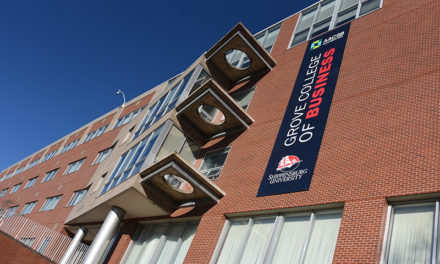Two Shippensburg University researchers recently broke new ground in land-use planning with a study that looks at population growth and the point at which it impacts a specific community’s ecosystem services.
Dr. Claire Jantz, assistant professor of geography/earth science, and James Manuel, a graduate assistant on the project from State College, spent a year studying how population growth may impact ecosystem services in the Albemarle/Charlottesville, Va.
Jantz describes ecosystem services as the ability of ecosystems to provide services we need; the ability of a wetland or forest to purify water, or trees to filter pollutants. She said her research identified population thresholds for the Albemarle/Charlottesville, Va. area at which the Virginia area’s ecosystem services would be hugely impacted.
Jantz’s report, “Estimating Impacts of Population Growth on Ecosystem Services for the Community of Albemarle County and Charlottesville, VA,” is also attracting attention.
“It seems that no community in the U.S. has tried to identify its optimal sustaining population size and use it as a planning tool,” said Jack Marshall, president of Advocates for a Sustainable Albemarle Population (ASAP), the group that initiated the study.
“She’s done such a great job on this research,” said Marshall, who is fielding inquiries from other groups interested in having similar research done in their communities. Marshall said the research is a major item for discussion when he attends a meeting of population specialists in Washington, D.C. in October.
Jantz said she’s also been contacted by a Massachusetts group about undertaking a similar study there and has been interviewed by media outlets.
According to Jantz, they used a relatively simple approach and existing research models to analyze how different population levels would impact ecosystem services. Though the methodology wasn’t ground-breaking, she said, what was innovative is that previous studies had been more focused, looking at individual ecosystem services while her study looked at a broad range of services.
Joe Bish, executive director of the New England Coalition for Sustainable Population, in Acton, Mass., called Jantz’s work, “a flagship study for the sustainability movement.”
Bish said he was unaware of any other study that took such a comprehensive approach to population growth’s impact on ecosystem services. His group seeks to raise awareness about regional, national and global population and sustainability issues in New England.
Jantz stressed that all conclusions were reached independently. “I want to make sure the science is represented properly,” she said.
She’ll head back to Virginia later this month where Marshall said he’s been asked to arrange sessions with the Charlottesville City Council, the Albemarle County Board of Supervisors, both municipalities’ planning commissions and the local League of Women voters.
That’s part of the process Jantz said she felt good about going into the study, that “the group we were working with has close ties to decision makers in the area.”
Jantz, who received her doctorate and masters degrees in geography from the University of Maryland, joined Shippensburg in 2005. Her research has focused on land use and land cover change in the Mid-Atlantic states with a particular focus on urbanization and its associated environmental and social impacts. She has been published in a wide variety of international and NASA-funded publications.



